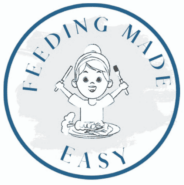Sesame is the ninth most common food allergy in the US (1). It was recently added as a top allergen in 2021 and has been required to be listed on food labels since January 2023.
When we eat sesame, we are eating the seed of the plant. For a person with an allergy, their immune system reacts to proteins in sesame, triggering an allergic reaction.
This post may contain affiliate links and when you click on the links I may earn a small commission at no charge to you. As an Amazon affiliate, I earn a commission from qualifying purchases.
How to Introduce Sesame
As with other allergens, introduce sesame as the only new food that day. If you are looking for a more comprehensive guide to introducing allergens, check out my Allergy Introduction Handbook. Please note that some of these suggestions include other allergens (indicated with a *).
- Tahini spread on toast* strips
- Hummus
- Ground sesame seed and avocado puree
- Substitute tahini for peanut butter in an energy ball recipe
- Sesame seeds on this teriyaki eggplant stir fry
Diagnosis
The gold standard for the diagnosis of a food allergy is an oral challenge. While scary, it’s actually an easy test to perform: if the child eats the allergen, do they consistently produce a reaction? If so, they are allergic. Then, to confirm a diagnosis, a doctor may use a blood test or skin prick test. A medical professional should always make the diagnosis. A self-diagnosis can lead to unnecessary restriction.
How to Avoid Sesame
It may not be as simple as just not eating sesame. Sesame can come into contact with other foods during processing. There can be cross-contamination in the kitchen if the cook touches sesame or a sesame product and then cooks another dish.
It’s very important to always check food labels. Currently, companies only need to voluntary label sesame, but starting in 2023, companies will need to list sesame clearly on the ingredients list in plain language or under the label in a statement that reads “Contains sesame.”
Places to Check
Always ask about ingredients in foods that you did not make yourself. When eating at a restaurant, there is always a risk of cross-contact, so it is important to make it very clear that there is an allergy.
Because sesame is not required to be on labels, before 2023, you should contact manufacturers to see if sesame is used in spice blends. Spice blends are considered proprietary information and aren’t required to be disclosed. They should be able to tell you if sesame is used.
Other Names for Sesame
These terms mean that sesame may be present:
- Benne, benne seed, benniseed
- Gingelly, gingelly oil,
- Gomasio (sesame salt)
- Halvah
- Sesame flour/oil/paste/salt/seed
- Sesamol
- Sesamum indicum
- Sesemolina
- Sim sim
- Tahini, tahina, tehina
- Til
What about sesame oil?
Most people with food allergies can safely consume highly refined oils, however sesame oil is not highly refined and should be avoided by those with sesame allergies. I generally recommend it as a food to keep sesame in the diet, but not as a food for introducing sesame, because the protein content is not as high as it is with a food like tahini.
Are sesame seeds nuts?
Sesame seeds are not nuts. If you have a nut allergy, you do not necessarily need to avoid sesame seeds and vice versa. It is possible to be allergic to both nuts and sesame.
Sesame Allergy Symptoms
A reaction to sesame via the skin or air is not common. However, if a child gets tahini on their hands and then touches their eyes or puts their fingers in their mouths, it could cause problems.
Although reactions can range from mild to severe, it is usually recommended for all kids with sesame allergies to have an epi-pen with them at all times. Epinephrine is used to treat anaphylaxis, a severe reaction to allergies.
This is not intended as medical advice. If you have any concerns about your child, reach out to your physician. If your child is having multiple symptoms or severe symptoms, call 911.
| Mild | Severe | |
|---|---|---|
| Skin | mild rash, some hives | widespread rash, hives all over the body |
| Face | itchy mouth, runny nose, sneezing | lip swelling, tongue swelling |
| Gastrointestinal | nausea | vomiting, diarrhea |
| Airway | none | coughing, wheezing, trouble breathing |

Krystyn Parks is a Registered Dietitian and Lactation Consultant who specializes in feeding children. She has a Master’s Degree in Nutritional Science from California State University Long Beach. She is an International Board Certified Lactation Consultant and has been registered with the Commission on Dietetic Registration since 2013.
